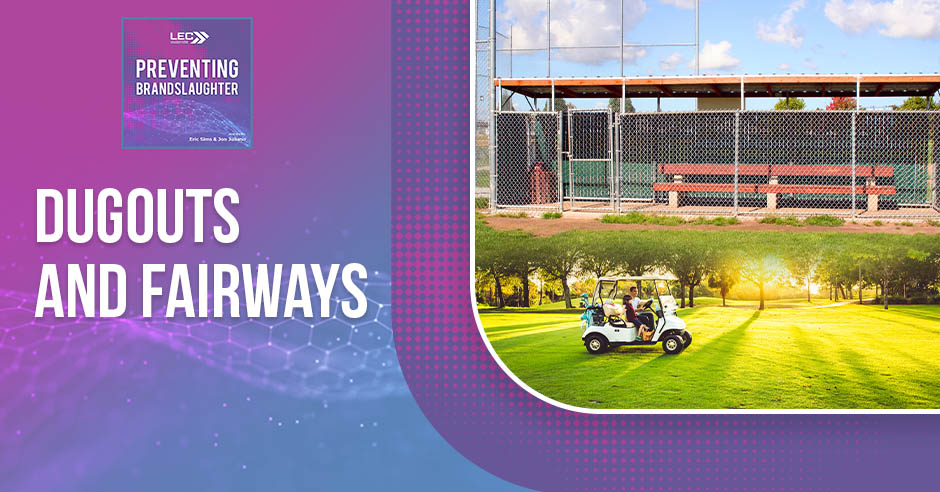
We are thrilled to bring you this exciting episode of Preventing Brandslaughter where we have special guest Kris Dehnert, Founder & CEO of Dugout Mugs and Bigg Golf. Kris has an extensive successful background of building dynamic brands with cult-like followings. Listen in as he shares his authentic stories and secrets about how he creates, builds, scales, and sustains such amazing customer-centric brands. As an added bonus, Kris was kind enough to open up and share his personal formula to Bigg success and happiness as a business owner and trendsetter.
—
Watch the episode here
Listen to the podcast here
Dugouts And Fairways
Talk With Kris Denhert About Dugout Mugs And Bigg Golf
I’m very lucky to have Kris Dehnert on our show. He’s the CEO and Owner of Dugout Mugs, Bigg Golf among another, and another of businesses and entities he’s got out there. Kris, thanks for being on the show with us now.
I’m glad to be here, bro.
I know you. I’ve been fortunate enough to get to know you a little bit over the last year and spend some time with you, so I know a little bit about your business, but I’m going to pretend I don’t know shit and anything about you. First, tell us a little bit about yourself, where you’re from, what are you into, and what are you all about.
I’m from Central Florida, born and raised here. It’s where I live now. What’s funny is I always love telling full stories. I don’t think you understand where you came from until you get a chance to get down the road and start reflecting on it. To me, that was the coolest part. I was probably 18, 19, or 20, and I got into the gym business. I got fired from every job I had up to that point, but I was about 21, I got into the gym business. I’m a closer. I’m a salesman. I started looking back all the way back to I was 8 or 9 years old. I was selling pencils at school, candy, toothpicks, and wire bracelets that I would sit there and make. I was making $5 to $8 a day before I was 10 just hustling.
I feel like hustlers are made and born, and then you can fine-tune some of those skills. Overall this time, I didn’t have a ton growing up. If it will be it’s up to me mentality, and I took that right into business. I hit some records with Gold’s Gym, and I was putting together amazing clubs with the guy who owned them. Back in 2008, that’s when I decided to break out on my own and be an entrepreneur, and I’ve been doing it. What I realized about myself is I’m very outside the box on the customer. You want to talk about customer experience. That’s what this is about. Let’s stay in the gym business for a second.
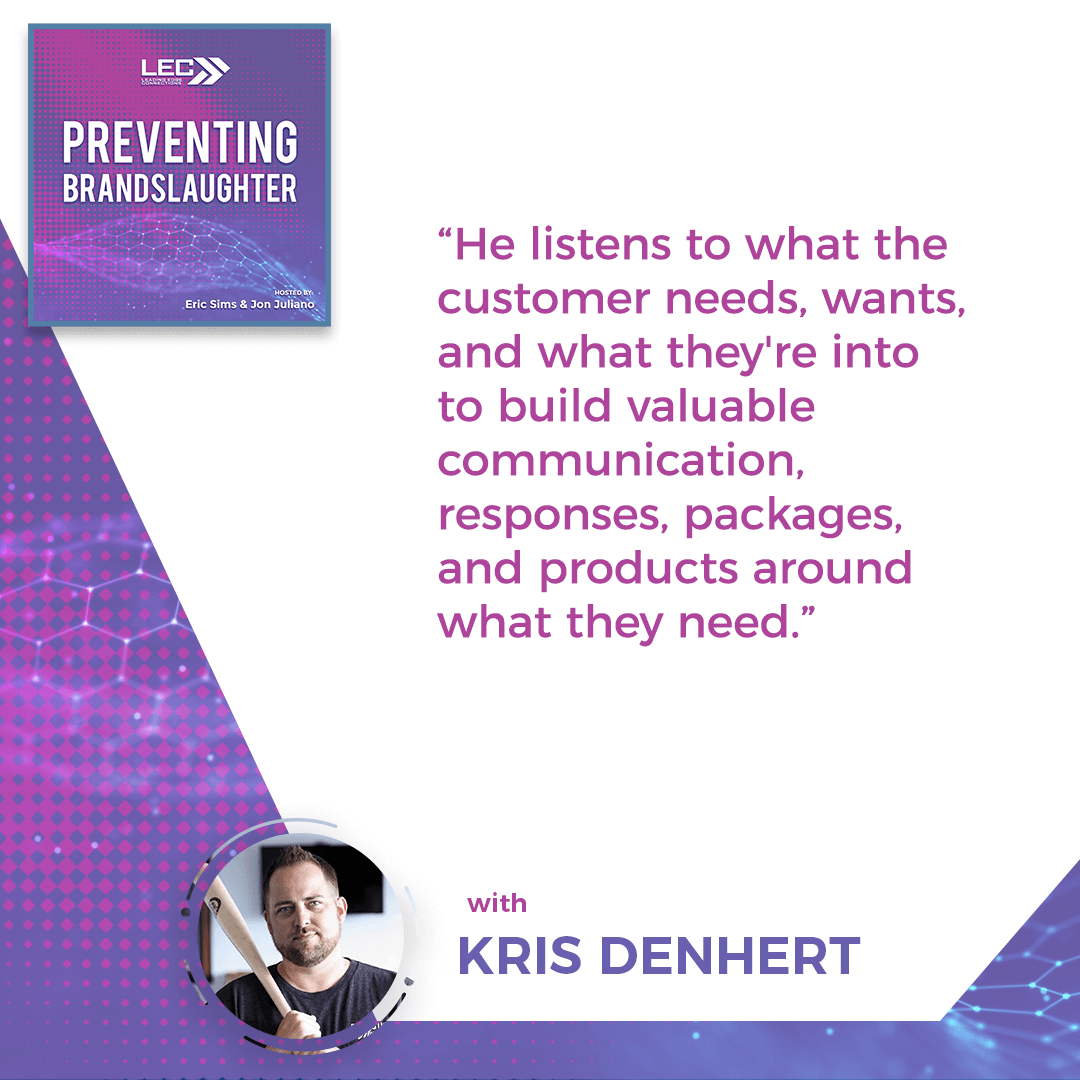
There were weekends when I would bring in a dump truck full of sand, and I would put it all in front of the gym. We put a tiki bar there, and we’re handing out protein shakes. The male trainers had on coconut bras just being funny. We pull up a big smoker, and we’re cooking food. It’s a member appreciation. This is the kind of thing that stuck with people. I still see people now when I’m working out, they remember me from back in the gym several years ago because of the way I handle things. One of my favorite sayings, I say it all the time, “It’s not somebody else’s job to remember you. It’s your job to be unforgettable.”
It accomplishes that, and you leave such a lasting impact that I see people a couple of years later, and they remember me from a gym. On big days, we would set up stages out by the road and big tents, and we would do spin classes on top of the stages next to the highway. When people would pull in to see what the hell was going on, we’d stick a hotdog in their hand that we are grilling under a tent. We’d put them in a golf cart, and we would drive them through the gym while they’re having a soda and eating a hotdog watching all these people work out.
At the end of this, “Listen, this might be your last hotdog and soda. Let’s have that conversation.” I think we did 152 memberships that day. That’s what I mean. Be outside the box. This world’s noisy as hell. I feel like people just get into that noise versus trying to go past it by going the extra mile. We were talking about your experience with a customer service rep that’s overseas. Now, I understand that’s a necessity with some companies, but I drove mugs the other day as the owner of my company. We’re $10 million to $15 million a year. I drove them to the event personally.
Today’s world is extremely noisy. People just get into that noise instead of trying to go past them by going the extra mile. Share on XIs it at the DeSantis event?
No. I mailed those. It was a different event. I don’t think enough people are doing that. They feel like they’re past that or they’re too good for that. I don’t know. I feel like that’s going that extra mile where there’s no traffic. It’s that extra mile from a customer experience standpoint. Back to my journey a little bit, I left the gym business and got into the real estate space. Again, I shook it up. I went right into there and there were a lot of dudes, Than Merrill, Ron LeGrand, and all these dudes, the godfathers of real estate and information marketing in 2008, 2009, 2010, and 2011. I went in, and I was leveraging this new website called Facebook at Gold’s Gym, right when it first came out.
I started doing that. I learned how to manipulate the algorithms of social media. Now, I was getting ranked for free way high up on YouTube, Google, and all these other places. I was like, “I’m going to get all these big guys doing it.” That started my first agency. I was flipping houses at the same time. I got into social media, and I really dug into social. I encourage anybody out there to identify what your core competencies are and what you believe you’re an expert in.
When building a brand, identify core competencies and the areas you're an expert in. Share on XMine is sales, outside-the-box marketing, and social media, those three things because I’ve spent tens of thousands of hours in them. That was my agency. I then went right into working with the Duck Dynasty people, Tebow pages, and launching an apparel company. $20 million later, this shit just went crazy, but it’s because I really anchored myself in the three areas in which I believed I was best. A lot of it, fortunately, is getting around experience.
I’m learning something new about you. I didn’t know you came from the gym business. That’s where I got my start, too, in my 20s, which was a long time ago. Everybody I know from that started there has gone on to do pretty amazing and cool things. It’s pretty interesting. That’s such fertile ground when you think about it. We all went in, and there was hardly any pay at that point in time from base pay. It was all keep what you kill type of environment and being very creative. It forced a lot of us to look at business differently because we had to come up with stuff on the fly and get people engaged in something that they need but don’t necessarily want a lot of times.
You are selling a fat person air. You’re like, “I’m going to sell you on the idea that you’re not going to be fat anymore.”
It’s not easy anymore.
You got to be a closer and read people. I think people are inward facing. They’re so concerned with themselves and how they’re doing something that they’re not paying enough attention to the other person. I’m a closer, without a doubt. I spent so much time listening and watching their body language, listening to what they were saying, watching for the pain in the words, everything I could dig into, and then I knew exactly what to say and when. There was a guy, and you could tell he had bravado. He had this and that. I literally told him. He’s like, “I’m going to talk to my wife.” I was like, “Bro, who’s wearing the pants? Your family’s unhealthy, and you all need to be in a gym.”
He’s like, “I’m wearing the pants. Here’s the credit card.” I’m like, “There’s no way in hell you could say that to everybody.” Let’s fast forward all the way to now. We are constantly pulling our customers. I’m about to spend a few weeks sitting at a farmer’s market just so that I can talk to people and put our mugs in their hands to get real-world feedback because then we take and put that into play in our business. You stop trying to move with the market, your ass is in trouble.
There are a lot of people in that pickle jar right now. The market’s changed quite a bit. The point of this show is we want to talk to people about things they may or may not be doing that is damaging or destroying their brands. One of the things, to your point, is just complacency of being like, “This is the way we’ve always done it and the way we do it,” type of flag that they wave around knowingly or unknowingly. You had a really cool point. I see when I hear any of your stories is you or your organization is an avid listener to the customer. You’re not trying to talk over the customer.
You listen to what the customer really needs, wants, and what they’re into, and you build your communication, responses, packages, or even products around what they need. Even when you do the bats, those are customized for what the customer wants. With Dugout, what are some of the things that you guys do internally? You mentioned one thing. You’re going to go to a market and listen to people, but are there other things that you guys do proactively constantly to just listen to the consumer?
We certainly send out surveys and do that. One of the things that not enough people are doing is marketing to people where they are, not where they were. What I mean by that is the world of COVID. Everybody experienced it here in Florida. It wasn’t as chaotic as it was in some places. We’re very blessed about that. I digressed. We marketed to people holding a baseball bat mug and sitting in a living room watching a game because there’s no tailgating and there’s nobody at the games. If you slow down and unpack a little bit about where people are in their life and mark it accordingly, that’s a huge move. Spend more time reflecting on that.
People were having struggles with money. When people were gifted all the free money, “Let’s just print more and give it away,” in that time, we weren’t as focused on the discounts. We’re like, “You got a little extra money hanging around?” Obviously, you do. We know you do. Everyone wants one of these mugs. Now is the time. Marketing where they were. When everybody’s free money got cut off, now, they’re a little bit more cognizant with their three new jet skis and they’re like, “Maybe I should watch out what I’m spending money on.” It was then like, “We have a pay overtime option, split it up over four months.” People are like, “That’s so helpful. I’ll take five.” That was certainly something we did.
Another was when people were just super disconnected. Again, I’m referring to those two years, COVID years specifically, because in those two years, we were back-to-back Inc. 5000, Forbes.com, Entrepreneur.com, Tampa Business Wealth Magazine covers, Tampa’s Fast 50, and just under $25 million in revenue. We kicked the shit out of those two years, and we did it by marketing to people where they were. One of the other things we did, which I was going to mention a second ago, is people were disconnected. We made a very strong push to connect people. We were going live all the time.
We were bringing in our friends like Rodriguez, Pete Rose, and Justin Turner. Every month, we got a rockstar baseball player coming in just shooting the shit for a half hour. Mariano Rivera jumped on for an hour. Pete Rose and I commentated on game 3 of the World Series for two and a half hours. All this stuff that was going on, we’re just bringing it into people’s homes. We knew that it wasn’t going to last. When people couldn’t afford something, we gave them a mug and say, “Just pay it forward or pay us back when you get it.” These efforts, we knew were going to far outweigh the loss at the time. We started doing giveaways. We had this little item, the shot glass. These are $30. We were giving away for free, pay shipping and handling, and helped us cover our costs, but we did 50,000 of them.
It is marketed to people where they are. It looks like we all need a shot. We’re just going to give it to you for free and cover the shipping and handling. It’s easy and has a low barrier to entry. Now, I have 50,000 extra customers. How many of them do you think order after the fact? Much of what I do and what we’ve done is calculated and mapped out, but it’s done so in a way that is very fans, followers, and customer-facing. Focusing on marketing to them, what’s in it for me? Behind the scenes, we’re doing it in such a way that it’s going to ultimately benefit the company.
In my conversations with you, you’ve been very clear, even when I’ve seen you speak to other people that are on stage about, “We make baseball bat mugs.” You’re big on creating experiences and memories for people. In that, listening to what they want and do. It’s a great point of giving away 50,000 pieces of a product for free. It’s very counterculture, as you would. Not very many people will look at their business model and say, “How do we get more customers? Let’s give away a bunch of free shit.”
It’s easy with software. Maybe say I do a trial period or something like that because it’s different. When you’re talking about product-based stuff, there’s a real cost of that. That’s a great example of thinking outside the box. That’s something that a lot of customers or businesses that are out there may want to entertain at this point in time.
Find something of value. What I’ve always been taught, told, and believed is, if you can’t sell it, don’t give that shit away because it is not worth nothing, a pen, a tchotchke, or some stupid video series or something. The dumbest thing we gave away, but it was still valuable, we had 30 minutes of uncut footage from the guy that wrote, narrated, and directed The Sandlot.
We went and partied and drank tequila with him and hung out at a bar all day. We made these amazing mugs. We kept having some patron shots, and we just kept recording all day. We got 30 minutes of uncut footage talking about all kinds of behind-the-scenes stuff with The Sandlot. That at least had value to those who loved and watched the movie, but we’ve never given away anything less than that.
That’s a really good point. I didn’t think about even that piece of it of if you can’t sell it, don’t give it away. It’s not worth anything to anybody. It’s not tchotchke stuff. You’re not giving somebody a pen or something like that. A lot of organizations, although I’m not putting that down, like we sending somebody a hat or sending somebody or whatever it may be because you make hats, but it’s at the point of, “Is it valuable to them? Is it something that’s going to create a customer for you in the long run? Is it something they’re going to remember you by?”
People send these out. Wholesale on these is $20, and retail’s probably $60 to $70. That’s a high-quality item that costs you $20. You send something like this, and they stop. They’re like, “Wow.” It goes on their desk. I’ve been just randomly watching ESPN, and they’re on Terry Francona’s desk next to his Hank Aaron Ball with his dad. I’ve seen people all over the country. These are gifted out by Miller Coors Corona. The guy that just bought the Mets a couple of months ago was gifted these. The cool thing about it is it finds something that is in line with the narrative of your business. Spend a little more, make a better impact, and then have a plan of what to do once that happens.
We just did the Tripwire thing with the golf company. We’re giving away sleeves of golf balls, so we put our money in our balls where our mouth is, text the word balls to whatever the hell our code is, and send them a sleeve of balls for free. We’re in the hole of about $7 or $8 after those things get delivered with shipping, pull pack, and fees. The reality is we looked at our data, and we have a 70% reorder rate at Bigg Golf, so 7 out 10 people will rebuy. These are lesser of a lead. Let’s say we get 30% to 35%, I don’t know about you, but if I give away 500 sleeves of balls and it turns into 150 orders, it’s not a bad gig.
It’s about playing a long game. It’s a long-tail game now. It always has been, to be honest with you. In my mind at least, it’s a long game. People aren’t playing the long game. They’re too focused on instant gratification, themselves, and the profit versus customer experience. I’m not saying burn all your money and have no plan for monetization, but I don’t think people are focusing enough on the long game.
People aren't playing the long game. They are too focused on instant gratification and gaining profit more than good customer experience. Share on XGuys like Simon Sinek and guys like that have all been talking about the infinite game and all that stuff over the last few years. They see it from a different standpoint and try to open people’s eyes at least to how you evaluate that differently. It sounds like you guys are doing a great job of leveraging real-time information and real data and facts and saying, “How do we look at it differently?” That’s very interesting that you guys did, because a lot of guys, when they look at their business models and cost modeling, they say, “Here’s our product or service. It costs X number of dollars to do, make, or send.” They then look at it very narrowly as to how they’re going to recoup that money.
That’s happening quite a bit right now in the CX world or customer service world. You and I were chatting about it before we got on about CX and customer service is the new sales. Taking a new and out-of-the-box look at the financial modeling around that and how that impacts that can change how you approach, generate, maintain, or keep the customers that you existingly have.
You’re looking at it and saying, “It’s not that we’re spending $7 here. It’s that we’re investing $7 here for a return of Y.” You’re not pulling that ‘out of your ass either. You’re not looking at it just going, “I don’t know.” You’re using data-driven means to do that, but you’re looking at the data, using it, and leveraging a little bit differently than probably traditional marketing or salespeople would.
Each business has its different intricacies. Golf balls, we don’t eat them, but they’re consumable. You use them, you lost them, and you give me more.
If you’re me, you lose a lot of them.
That’s one of these things that it’s not seasonal. To an extent, it is. It’s consumable, so we did a membership. With Dugout, 83% of the time, people buy these as a gift. We go really heavy in the gifting seasons, like Mother’s Day, Father’s Day, Opening Day, and graduation, and then most of Q4 for Christmas, holidays, and things like that. Each business is a little different, but I think people need to just change the lens a little bit and focus a little bit more on the long game. Unless the model is to hit it, quit it, and get out the door, you probably ought to play a little bit longer game. It’s not a new concept.
If you think all the way back to Maya Angelou, people don’t care or won’t remember what she said or did. They’ll remember how you make them. That’s true in marketing. In my outside-the-box marketing strategies that I’ve always done, they have a tale of decades plus. I’m still experiencing it. People that have crossed my path and a venture that I’ve had or a thing that I’ve done, they remember the way I treated them, and things like that. It’s all a long game. It comes down to maybe changing ourselves a little bit because how you do anything is how you do everything.
You can’t be authentic and invest and play the long game in business but then not in your personal life and relationships. It’s one of those things where you just have to make some adjustments and make it a daily practice. Some of my daily practices are all based on, “Am I having fun? Did I get to play with my friends? Did I take time away from my kids?” I have a lot of different metrics that are involved. As easy, you can add in there and say, “Did I do something today or 2 to 3 times that planted a seed that I can harvest down the road?”
You do bring up something I wanted you to share because you’ve shared it with me before, and I thought it was life-changing for a businessman, and just one of the best perspectives on business that I’ve come across. It was around how you grade or measure a decision or an adventure, whether you get into that. Can you share a little bit about how you do that? You’ve been through several companies and have been an entrepreneur for a long time. That experience has given you a unique perspective that maybe somebody who’s earlier cycle, or maybe not, and they’re just in it. To me, it was just phenomenal the way you put it and the way you make your decisions.
What you’ll find is that either you’re good enough at something that every time you do that thing, it’s getting in a rut. If I don’t want to be a plumber, but I’m good at being a plumber, my ass will be stuck being a plumber. I’m not going to like what I’m doing all the time. When I had a health scare back when my daughter was about 6 months old, and I had a 30% chance of not making it, which was plenty, a big enough percentage for me to open my eyes a little bit. I had said a few prayers and I made a couple of commitments like, “Get me out of this, and I’m going to change the way I go about things.” I did. It’s really about understanding your personal metrics a little bit better.
Mine are very heavily rooted in good times. You don’t really know when that clock gets punched. I was talking to a friend of mine, Sam, the other day, “If you don’t make it to tomorrow, were you happy with the way today went?” Not a lot of people will think about it like that. With that in mind, I thought to myself, “Let’s change my metrics.” At least, start there. When you’re doing more things more consistently, you’ll see that the rest of it piles on. It’s always a practice. Nobody’s perfect at it. It was, “Can I play with my friends? Is it experiential and fun?” I don’t even think came into play until 5 or 6 boxes down the thing.
Can I leverage my network to make this thing better? Is it bringing good things into the world? Is it making good vibes? Can I get to hang out with cool people? Is it taking time away from my family? I’m fresh from the gym because I work out with a trainer. I got working at home. I’m golfing with the Tigers, and I get to go do that. We’re hanging out. On Monday, I’m doing the Johnny Damon Celebrity Pro-Am. A couple of weeks after that, we’re going to be in Los Cabos, Mexico. You’ve known me long enough to know that what I’m saying is very accurate. We don’t jeopardize.
What’s cool about it is a lot of people see where you’re at now. With many successful entrepreneurs or business owners, they may say overnight success or whatever it is. One, you grinded early, like anybody else. You’re at flea markets selling the stuff before you started hitting the “home runs” and doing what you’re doing. I know the story of when you looked at Bigg Golf, that was the criteria you ran down to say, “Should I get involved with this or not?” It was a good deal. It wasn’t a matter of whether was it a good deal or not. Is it a good opportunity? You took a step back and said, “Is this a good opportunity for me? Is this the right opportunity for me?” It matched your criteria.
I get pitched every month for something because I still own Dehnert Media Group, which is a consulting company I’ve had for a couple of years. Companies will come into me, and they’re like, “I do three-month contracts. Can you coach me for three months? We’ll talk about marketing, brand strategy, and maybe some connections at work, things like that.” I love it. It keeps me sharp, and I can help people do what they’re doing better than they’re doing it. That’s one of my absolute favorite things because I truly believe that if you’ve helped enough people along the way, you’ll never hit the bottom. I could fall off a cliff, and there are so many hands that would catch me before I hit the bottom because of the good vibes I put out in the world. With that company, I’m always being pitched on something.
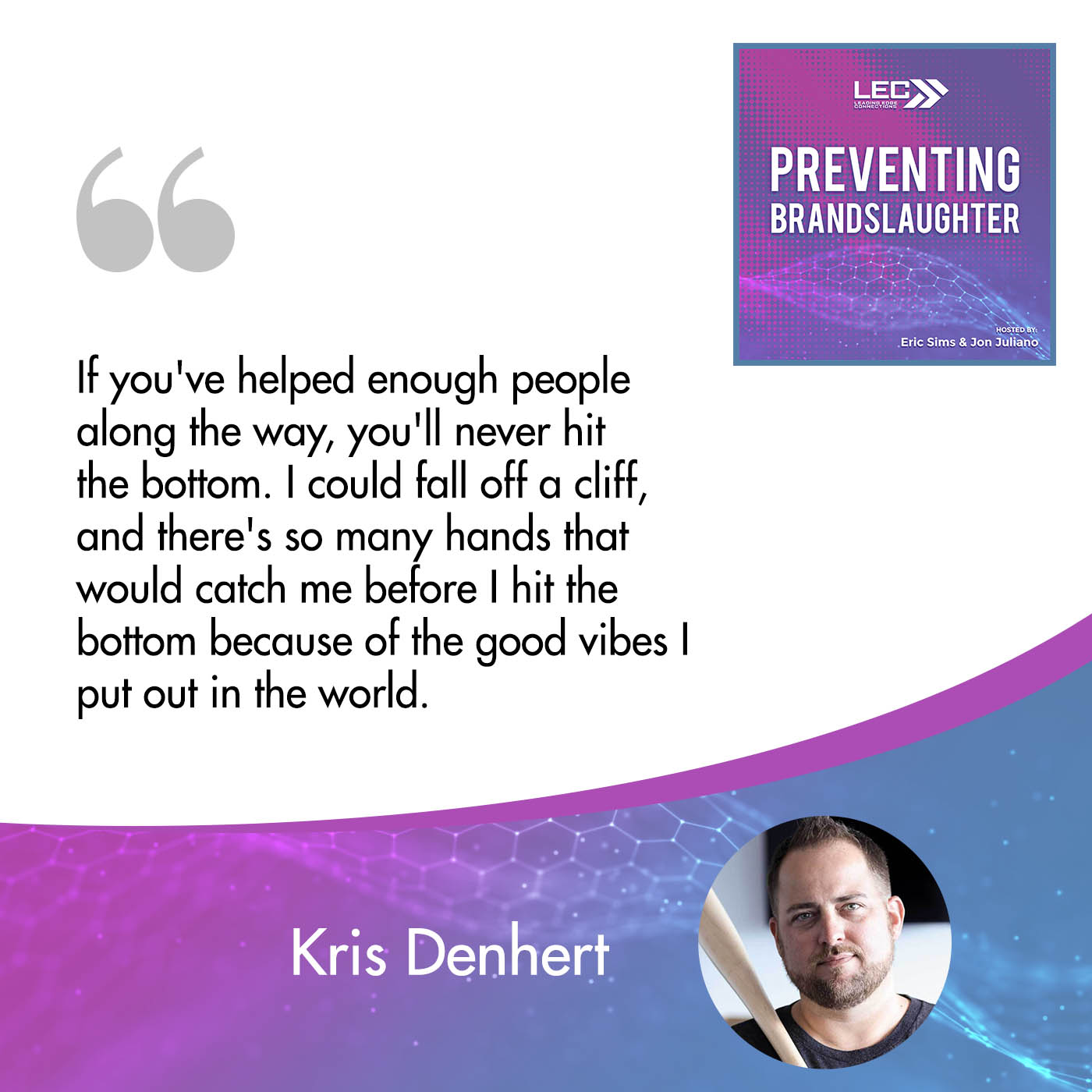
Very rarely do I take a client with that because it has to match those things. Is it fun? Is it doing good? Somebody’s like, “I got this new porn site.” I’m like, “Good for you, man, but that is not my jam. Sorry.” I’m not going to bring that more of that shit into the world. Can I play with my friends? Can I leverage my network? When Bigg Golf came along, I like golf. I golf as often as I can. Is it the company’s Bigg Golf? It’s big balls, super fun and funny to play with, marketing-wise. I have a cigar holder, and I’ve always wanted a cigar line, so now, I launched the BIGG Stick Cigar Line. Again, is it experiential? Is it fun? Can I leverage my network? Most certainly. Most of the people that know golf, and I know plenty of people in the golf space constantly at these tournaments and things like that.
The big one with that is, is it going to take away from my time? There are three other guys in that business. I’m a 40% equity holder, and the rest of the guys split up the other 60%. With me, all I’m responsible for is 1 to 2 hours a week of involvement, putting in the right dots, and jumping on a weekly call to make sure things are there. It wasn’t taking away time because Dugout is our priority. It always will be until we sell it. I didn’t want to take away from that, and I certainly don’t want to take away from my kids, my wife, my house, and my good times, and it wasn’t. It fit all that criteria, and all those boxes got checked. I then took a look at it and said, “Was it scalable?” It is. It’s my marketing ideas, their execution, the network I have, the product, and the quality, and I pulled the trigger.
The same thing happened with Dugout at the end of 2016. Randall came up with a great idea. He sat down with me, and I was like, “This guy’s sharp. He’s genuine, nice, and cool. It’s a cool business. It’s an interesting idea.” We decided to partner up and give it hell. At this rate, it’s happening about once every 6 or 7 years, I run into a cool little venture that I can run with. Dugout was a little different. I stepped in as CEO, and we’ve been grinding it out since the very beginning, but that was before I set some of these metrics in stone. I wouldn’t change any of it, but I also am very clear on not bringing things in that are going to dilute it at all.
I know we’ll be cognizant of time too. I know you’re a busy guy, so I appreciate you being on the show. To put a bow on this and bring in what you’re talking about, an excellent topic that most people don’t even get into when you’re thinking about customer experience is being true to yourself as an owner, as the leader of the business, and that DNA of your company or companies.
Stay who you are. Put those criteria in place regardless of the market space, recessions, and those things. Be true to yourself, and that will bleed down into your people and customers. Ultimately, it will impact your brand in a positive way versus being a poser and killing your own brand because you’re trying to be somebody that you’re not doing something that you shouldn’t be doing.
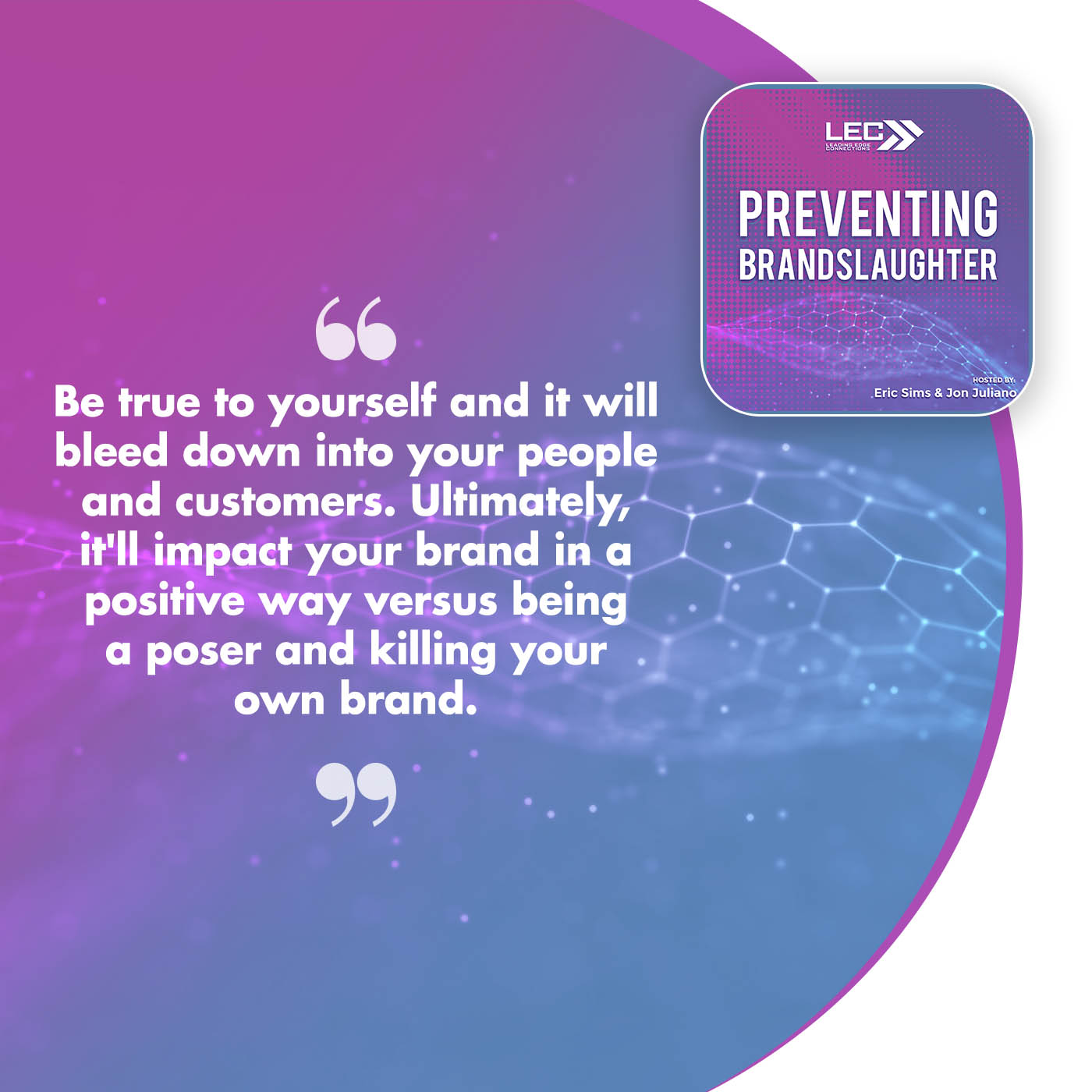
You’re trying to be everything to everybody. In this world in particular now more than ever, you have to stand for something, or else you’ll stand for nothing. You’re just going to be just a fucking fart in the wind. Nobody cares about you and your thoughts because you’re pandering to everyone all the time. You don’t have to be this crazy right-wing, left-wing political, talk about religion, or be out of control, but you have to be unapologetically authentic. Do they believe what you believe? You have to create that.
With Dugout, in particular, you’ll always catch Randall and I, backward hats, flip-flops, and shorts. If I’m on stage, it’s jeans and flops. We are unapologetically authentic. Whether we’re on a stage, at a baseball game, or anywhere, you’re going to get the same guys every single time, and people know that. Over these years, we’ve collected 600,000 or 700,000 customers. They all have seen the same experience for the most part or experienced us similarly. From the emails we send, and confirmation emails, we’re all going crazy, walking off, and homerun in Wrigley. it’s so cool. They’re all cheering your name at the warehouse. It’s a fun, cool vibe. That’s us.
That’s not every company, but what I would say is it comes back to that reflection. People are not reflecting enough. What do you stand for, and what do you not stand for? Who are you? Who aren’t you? Be very clear with some of these things, and at least lean in that direction and be more authentic because people are savvy. They see through the bullshit and cut through the noise. If you’re trying to be everything to everybody and talk differently to different clients and customers, it’s not authentic and genuine, and this shit’s going to bite you in the ass.
I agree. People crave authenticity. That’s one of the things that differentiates you guys from what you do. We’ll wrap things up.
If you’re not authentic, you aren’t living true every day, which has so many negative repercussions to it. You’re doing yourself a disservice by not being authentic. People don’t ever get the chance to fall in love with you and what you’ve created and the brand because the company has its own personality in a lot of cases. Develop that personality. Let people have a relationship with that personality. Don’t constantly change it because you’re saving a buck here, this, or that. People, now more than ever, need consistency, something they can rely on, and authenticity.
From a partnership standpoint, because I have partners, I feel like it’s a similar train of thought. If I’m having a bad day, at least I’m working with good people. If I’m having a good day, we’re fucking killing it. Good people, good times, good money, good everything, it makes it tolerable. It increases the longevity of the business and the relationship because those things are synonymous, your business and the relationship. Your business is in your personal life. I think relationships crave authenticity and consistency just like anything else, and that just flows right into the business.
I couldn’t agree more. If anybody wants to get in touch with you, how do people get in touch with Kris?
Probably LinkedIn. I’m a ghost everywhere else. That was a joke. You all know when I make it because you don’t see my ass again. The truth is I love chatting with business people on LinkedIn and Instagram. I got rid of Facebook with all that bull crap going on. Instagram is private. Dugout Mugs, these things are sick. DugoutMugs.com, they’re amazing. If you know anybody that golfs, BiggGolf.com. It’s super fun. We make balls, cigar holders, and hollow-out balls.
You’re talking about personality. From the very beginning, when I took control of that brand, I told them and said, “I know you wanted to be like this super serious brand, this, that, and the other, but we’re not going to do that.” We changed the motto of the company, “We’re not here to make your game better. We’re here to make your game more fun.”
I dig that because it moved as soon as you hit it. I hit with your golf balls, I’ve had your cigars, and purchased your mugs. I’m a triple customer. I buy what you’re doing. It’s such a cool vibe. What attracts customers is it’s not just the products. It’s the community within those products that they get to be a part of connecting to what you guys are doing and all the other people that are connected that you guys do a phenomenal job of sharing that with the world and allowing your customers to participate. They’re not just consumers of what you do. They’re participants.
You tell them too. If you use our mugs, you’re a baseball super fan that wants to do something cool and strike up a conversation. You want to be one of the first of your friends to have this cool item. When it comes time to gift something, you want that wow factor. That’s off the top of my head. We don’t make mugs. We make memories. This is how we think. When people believe what we believe, think how we think, and see what we see, what they’re buying is a representation of how they already think, and we have solidified that thought process. With Bigg Golf, we’re not here to make your game better. We’re here to make it more fun by offering high-quality, inexpensive golf stuff that’s fun to play with.
When people believe what you believe, think how you think, and see what you see, what they are buying from you is a representation of themselves. Share on XPlay with our big balls, things like that. That’s what they want. That’s why they make flip-flops with spikes. That’s why they encourage speakers that fit in golf carts because people are out there having fun. If they believe what we believe and see what we see, then we can convey that. We’re not going to give them scientific BS about how the ball’s going to go ten yards further. We pick the segments of the people, and we understand what they think, see, and believe, and then we market to them where they are. Go figure that.
It’s following that pattern. It’s been great, man. Thanks for coming to the show. Everyone, this has been Kris Dehnert. He’s with Dugout Mugs and Bigg Golf. I will invite you back on again. I could probably have ten shows with you just conversing because I love hearing all the stories and talking about everything, and you’re a wealth of knowledge. I appreciate you being on. Anybody that wants to get in touch with Kris, reach out to him on LinkedIn. Thanks for tuning in to the show. We’ll see you in the next episode.
Thanks again.
Important Links
- Dugout Mugs
- Bigg Golf
- LinkedIn – Kris Dehnert
About Kris Dehnert
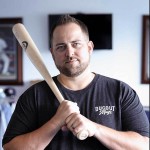 Kris Dehnert is the founder of the Dehnert Media Group. Over the last 12 years, he has found success in numerous verticals, including real estate, apparel, hard goods, affiliate marketing, strategic partnerships, etc. His main focus is rooted in eCommerce and social media where he’s managed to surpass $60 million dollars in sales online.
Kris Dehnert is the founder of the Dehnert Media Group. Over the last 12 years, he has found success in numerous verticals, including real estate, apparel, hard goods, affiliate marketing, strategic partnerships, etc. His main focus is rooted in eCommerce and social media where he’s managed to surpass $60 million dollars in sales online.

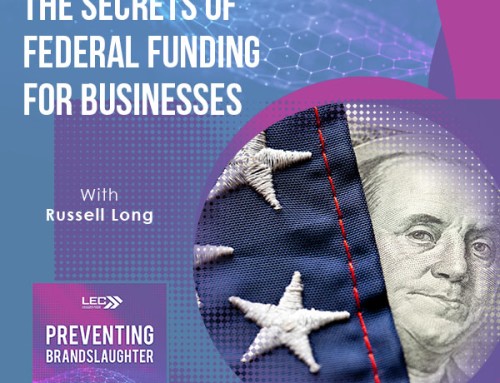
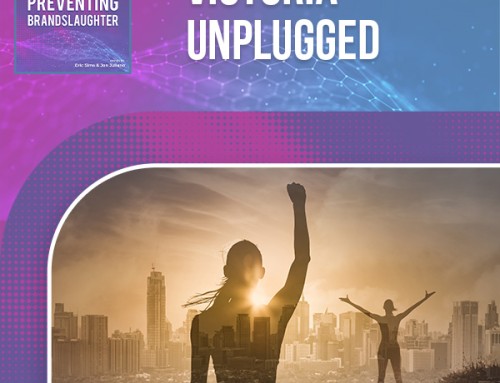
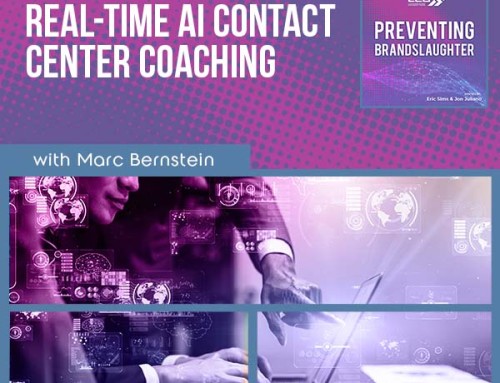
Leave A Comment